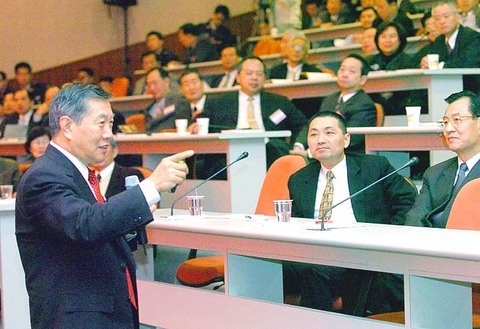A representative of the family of the main suspect in the March 19, 2004, election-eve shooting of the president and vice president yesterday challenged the forensic investigation carried out during the case by Chinese-American forensics expert Henry Lee (李昌鈺).
Chang Hsi-kuang (張曦光) called a news conference at the Alumni Hall of National Taiwan University, offering what he claimed was "new evidence" concerning the bullets used in the shooting, and asking Lee, who arrived in Taiwan on Sunday for a four-day visit, for an explanation.
Materials science professor Hsu Tung from the National Tsinghua University and former Hualien County Commissioner Wang Chin-feng (王慶豐), who had taken part in a "319 truth investigation commission" set up by the Legislative Yuan, also attended the news conference.

PHOTO: WANG MIN-WEI, TAIPEI TIMES
Chang, who has represented the family of Chen Yi-hsiung (陳義雄), the only suspect in the shooting, has repeatedly questioned the forensic report of the investigative team.
As Lee took part in the crucial forensic work leading the investigative team to identify Chen Yi-hsiung as the main suspect, Chang asked for Lee to address his doubts concerning the investigation.
Lee was to speak on the forensic investigation and reconstruction of the crime scene at the Taiwan Police College yesterday and today. He will give a speech on new forensic concepts to ranking police officers. He was also scheduled to appear on a call-in TV program last night to answer questions about the forensic work during the shooting investigation.
President Chen Shui-bian (
The opposition has never produced evidence to substantiate its accusation, and the Supreme Court has upheld the validity of the president's re-election.
After a lengthy investigation, with Lee assisting in crime scene reconstruction and forensic examinations, the "319 investigation task force" ended its probe last August after identifying Chen Yi-hsiung as the main suspect. He was found dead in Anping Harbor in Tainan about 10 days after the shooting. It is believed that he committed suicide.
The family of Chen Yi-hsiung had previously testified that he carried out the shooting because he was depressed about being unemployed and blamed the president's policies.
However, his wife, Lee Shu-chiang (李淑江), retracted her testimony in the middle of this month, claiming at a news conference that she was coerced into making statements implicating her husband.

The Ministry of Economic Affairs has fined Taobao NT$1.2 million (US$36,912) for advertisements that exceed its approved business scope, requiring the Chinese e-commerce platform to make corrections in the first half of this year or its license may be revoked. Lawmakers have called for stricter enforcement of Chinese e-commerce platforms and measures to prevent China from laundering its goods through Taiwan in response to US President Donald Trump’s heavy tariffs on China. The Legislative Yuan’s Finance Committee met today to discuss policies to prevent China from dumping goods in Taiwan, inviting government agencies to report. Democratic Progressive Party Legislator Kuo Kuo-wen (郭國文) said

The Ministry of Economic Affairs has fined Taobao NT$1.2 million (US$36,900) for advertisements that exceeded its approved business scope and ordered the Chinese e-commerce platform to make corrections in the first half of this year or its license would be revoked. Lawmakers have called for stricter supervision of Chinese e-commerce platforms and more stringent measures to prevent China from laundering its goods through Taiwan as US President Donald Trump’s administration cracks down on origin laundering. The legislature’s Finance Committee yesterday met to discuss policies to prevent China from dumping goods in Taiwan, inviting government agencies to report on the matter. Democratic Progressive Party

Taiwan and its Pacific ally Tuvalu on Tuesday signed two accords aimed at facilitating bilateral cooperation on labor affairs, according to Taiwan’s Ministry of Foreign Affairs (MOFA). The governments inked two agreements in Taipei, witnessed by Foreign Minister Lin Chia-lung (林佳龍) and visiting Deputy Tuvaluan Prime Minister Panapasi Nelesone, MOFA said in a news release. According to MOFA, the agreements will facilitate cooperation on labor issues and allow the two sides to mutually recognize seafarers’ certificates and related training. Taiwan would also continue to collaborate with Tuvalu across various fields to promote economic prosperity as well as the well-being of their

Sung Chien-liang (宋建樑), who led efforts to recall Democratic Progressive Party (DPP) Legislator Lee Kun-cheng (李坤城), was released on bail of NT$80,000 today amid outcry over his decision to wear a Nazi armband to questioning the night before. Sung arrived at the New Taipei District Prosecutors’ Office for questioning in a recall petition forgery case last night wearing a red armband bearing a swastika, carrying a copy of Adolf Hitler’s Mein Kampf and giving a Nazi salute. Sung left the building at 1:15am without the armband and covering the book with his coat. Lee said today that this is a serious